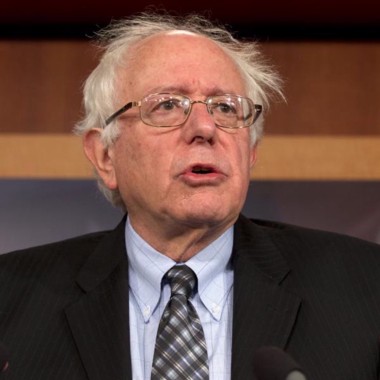Late last year, Sen. Bernie Sanders of Vermont set progressive hearts fluttering when he floated the idea that he might run for president (see “Bernie in 2016?”, Dec. 17, 2013, www.valleyadvocate.com).
In a number of recent interviews, Sanders—a democratic socialist who runs as an Independent but caucuses with the Democrats in the Senate—has said he’s considering running in part because of his concerns about presumed Democratic nominee Hillary Clinton’s commitment to addressing crucial issues like climate change and economic inequities.
And he’s not the only one with those concerns: a group of progressives from Clinton’s own party is now calling on Sanders to run for president as a Democrat.
Earlier this month, Progressive Democrats of America launched an online petition (at www.credomobilize.com) praising Sanders as “a lifelong champion of working-class Americans, and an eloquent defender of labor unions, living wages, expanded Social Security, protecting Medicare [and] Medicaid, moving towards single-payer health care for all, and choosing ‘prosperity’ over ‘austerity.’” It also calls Sanders an effective leader in the fight to stem climate change and “one of the very few top officeholders who will stand up to the 1 percent, who gets it that money is not speech, and corporations are not people.”
Within a couple of days of its posting, the number of signatures on the petition was approaching 4,000.
The PDA petition comes on the heels of an interview with The Nation magazine in which reporter John Nichols asked Sanders whether, if he does opt to run, he would run as a Democrat. “I want to hear what progressives have to say about that,” Sanders replied.
The progressives in PDA, at least, say that they want him as their party’s standard bearer. The petition, PDA National Director Tim Carpenter told the Advocate, is a message to Sanders that a core group in the party “has his back” and is ready to work in support of his candidacy.
What about Clinton, the favorite of the Democratic establishment? “Where do we start?” Carpenter responded, before ticking off a list of the former senator and secretary of state’s non-progressive positions over the years, including her vote for the war in Iraq (“one thing many of us can’t overlook”), her support of damaging trade policies (“NAFTA is the Clinton legacy”), and her abandonment of a single-payer option after her failed efforts at healthcare reform during her husband’s presidency.
Carpenter also objected to the “anointment process” that has made Clinton the presumed Democratic nominee without any real discussion, which he says does a disservice to grassroots elements within the party.
It would be a mistake for Sanders to run as an Independent, continued Carpenter, pointing to the cautionary tale of Ralph Nader’s 2000 presidential campaign as the Green Party’s candidate—a campaign, many contend, that handed the election to George W. Bush by drawing votes away from Al Gore. (Nader supporters have steadfastly dismissed that claim, suggesting, among other things, that the fault lay with the Democrats for not running a candidate that progressive voters could rally behind.)
PDA works for change from within the party; without major electoral reforms, like a healthy public campaign finance system and proportional-representation voting, third parties cannot be effective, Carpenter said.
A Sanders spokesperson declined to comment on the PDA petition but referred the Advocate to Sanders’ recent interviews on the topic of the 2016 election, including the one in The Nation. In that interview, the senator discussed the “more radical” but difficult option of running for president outside the two major parties.
“[E]ssentially, when you’re doing that, you’re not just running for president of the United States, you’re running to build a new political movement in America—which presumably would lead to other candidates running outside of the Democratic Party, essentially starting a third party,” Sanders said. “That idea has been talked about in this country for decades and decades and decades, from Eugene Debs forward—without much success. And I say that as the longest-serving independent in the history of the United States Congress.” Third-party candidates, Sanders added, have trouble getting media coverage and securing invitations to debates, among other challenges.
It’s important to note that Sanders has not yet declared his candidacy; while he’s “talking to people around the country,” he told Nichols, he’s not putting together a campaign organization or raising money, and he thinks it’s too early to start talking about a presidential bid before this fall’s mid-term elections.
Nonetheless, Sanders clearly articulated the need for an alternative to the presidential contest he sees shaping up: “My experience and my political instinct tells me that a lot of the discussions about 2016 are minimizing the profound disgust that people are having now with the status quo—and they’re desperate for a message that addresses that disgust,” he said.
“If I run, I’m not going to be raising hundreds and hundreds of millions of dollars. I think I have the capability of raising a lot of money, and that’s important, but that at the end of the day is not going to be what’s most important. What’s most important is this idea of a political revolution—rallying the working families of this country around a vision that speaks to their needs. People need to understand that if we are prepared to stand up to Wall Street and the big-money interests, we can create a nation that works for all Americans, and not just the handful of billionaires.”•



